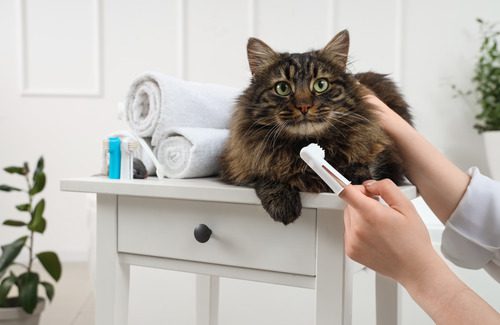Maintaining your cat’s oral hygiene might not be the first thing that comes to mind when you think about their health—but it’s a critical part of their care. Dental disease is extremely common in cats, and it often develops quietly. Over time, it can impact their comfort, behavior, and overall health. While regular professional cleanings at your veterinarian’s office are essential, your role in managing your cat’s dental care matters just as much. If you’re looking for practical ways to support your cat’s dental health, you’ve come to the right place. Below are some helpful cat teeth cleaning tips from the team at Acton Animal Hospital in Acton, MA. To schedule a dental exam or professional cleaning for your cat, please call us at 978-263-7477.

Why Cat Teeth Cleaning Matters
Just like humans, cats can develop plaque, tartar, and gum disease without regular dental care. In fact, most cats over the age of three already show some signs of dental disease. Unfortunately, many of these issues go unnoticed by pet owners until they become severe.
The Health Risks of Poor Dental Hygiene
Cat teeth cleaning helps manage bacteria in the mouth and prevents the buildup of tartar that leads to gingivitis and periodontal disease. Without regular cleanings, bacteria can travel beneath the gumline and cause infections that affect not just the mouth but also the heart, liver, and kidneys. These risks highlight the importance of maintaining a consistent dental care routine.
Signs Your Cat May Have Dental Issues
Bad breath, difficulty chewing, pawing at the mouth, and visible tartar are some of the signs that your cat may already be experiencing dental issues. Scheduling regular exams and cleanings at Acton Animal Hospital can help identify and address problems early. Call 978-263-7477 to book an appointment today.
Professional Cat Teeth Cleaning at the Vet
Veterinary dental cleanings go far beyond what any pet owner can do at home. These cleanings are performed under general anesthesia to allow for a thorough evaluation and removal of plaque and tartar both above and below the gumline.
What Happens During a Professional Cleaning?
During a cat teeth cleaning at Acton Animal Hospital, our team conducts a full oral examination and uses specialized tools to scale away tartar. We also polish the teeth to smooth the surfaces and slow future buildup. If there are signs of infection or damaged teeth, dental X-rays may be taken to evaluate the health of the teeth below the surface.
This process not only improves oral health but also helps prevent more serious complications. Skipping professional cleanings can lead to painful infections, tooth loss, and systemic health issues that require more extensive—and expensive—treatment later on. If your cat hasn’t had a dental cleaning in the past year, give us a call at 978-263-7477 to schedule a visit.
How to Support Cat Teeth Cleaning at Home
While professional cleanings are the foundation of dental care, consistent at-home habits can make a big difference in your cat’s long-term oral health. Although cats don’t always make it easy, even small efforts at home can reduce the risk of dental problems.
Toothbrushing Basics
Brushing your cat’s teeth is the most effective way to reduce plaque between veterinary cleanings. Start slowly and use a soft-bristled toothbrush designed for cats, along with a pet-safe toothpaste. Never use human toothpaste—it contains ingredients that are toxic to cats. Begin by letting your cat taste the toothpaste and get used to having their mouth handled. Gradually work up to brushing the outer surfaces of the teeth using gentle, circular motions. Aim to brush a few times a week, if not daily. If your cat resists brushing, you can still support their dental health in other ways.
Dental Treats and Chews
Many dental treats and chews are designed to support cat teeth cleaning by mechanically reducing plaque as your cat chews. Look for products approved by the Veterinary Oral Health Council (VOHC), which meet standards for safety and effectiveness. These treats are not a substitute for brushing or professional cleanings, but they can supplement your cat’s dental care routine, especially for cats who won’t tolerate a toothbrush.
Oral Rinses and Water Additives
Oral rinses and water additives can also support your cat’s dental health. These products help reduce bacteria in the mouth and freshen breath. Always choose products made for cats and consult your veterinarian before adding them to your routine. These options can be particularly helpful for cats who are older, have dental sensitivities, or simply don’t accept other forms of at-home dental care.
Signs Your Cat May Need a Dental Exam
It can be difficult to know when your cat needs dental care, especially since cats tend to hide signs of discomfort. That’s why it’s important to watch for changes in behavior, eating habits, and appearance.
Symptoms to Watch For
- Bad breath
- Red or swollen gums
- Visible tartar
- Drooling or pawing at the mouth
- Changes in eating habits
If you notice any of these signs, your cat should be evaluated by your veterinarian. The team at Acton Animal Hospital can perform a thorough dental assessment and recommend the right care plan. Call 978-263-7477 to book an exam.
How Often Should Cat Teeth Cleaning Be Done?
Most cats benefit from an annual professional dental cleaning, though some may need cleanings more frequently based on their age, breed, and dental health. Cats with a history of dental disease may require cleanings every 6–12 months to manage ongoing issues.
Your veterinarian will assess your cat’s oral health during their wellness exams and can recommend the best schedule for cat teeth cleaning. Regular check-ups also give you the opportunity to discuss any concerns and stay on top of changes in your cat’s dental needs. Keeping up with cleanings and preventive care helps avoid larger problems and can save you money in the long run by avoiding costly treatments later.
Cat Breeds That May Need More Frequent Dental Care
Some cat breeds are more prone to dental issues than others. Breeds with short faces, such as Persians and Himalayans, often have crowded teeth, which can trap food and lead to plaque buildup. Oriental breeds, like Siamese or Abyssinians, are also known to develop periodontal disease more frequently.
If your cat belongs to a breed with higher dental risks, they may require more frequent cat teeth cleaning and closer monitoring by your veterinarian. Your vet may recommend dental X-rays and more frequent evaluations to catch problems early. Even if your cat seems healthy, breed-specific concerns should always be part of their care plan. Contact Acton Animal Hospital if you have questions about your cat’s dental care needs.
Supporting Your Cat’s Health Through Dental Care
Oral health is often overlooked, but it directly affects your cat’s comfort, behavior, and overall well-being. Investing time in cat teeth cleaning—both professionally and at home—can prevent unnecessary pain and help your cat stay active and content. Consistent care, early intervention, and regular dental exams all contribute to better long-term health. If it’s time to schedule a dental cleaning or you’ve noticed any signs of discomfort in your cat’s mouth, the team at Acton Animal Hospital is happy to help. Please call 978-263-7477 today to book your cat’s dental exam or cleaning.
Recent Posts
About Us
Our veterinarians in Acton, MA bring over 80 years of combined experience and a multitude of services for your pet.
